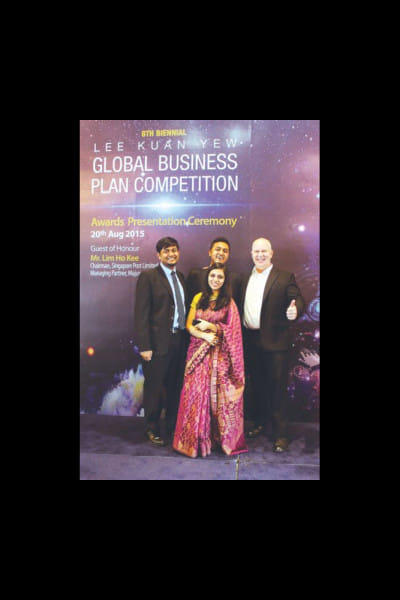Life Collar: A life-changing social innovation for all

In recent times, the youth of Bangladesh has been phenomenal in setting a global footprint in every part of the world. Mere participation in global business competitions is no longer the benchmark but rather the norm, and enjoying success in such avenues has become conventional. On August 20, 2015 a team from IBA, DU followed suit.
Held in Singapore and named after its revered founder Lee Kuan Yew, the Lee Kuan Yew Global Business Plan Competition is designed to engage students with business plans and entrepreneurial traits on a global scale to pitch their ideas, network with actual investors and attract seed funding to further their business ambitions pertaining to a social cause. The competition follows a rigorous series of three rounds, whereby business plans are thoroughly analysed, teams are given feedback and mentored by global experts, and finally the top 6 teams globally are selected to fine tune and present their vision to turn it into reality.
This year, there were 185 submissions from 445 students studying in 140 universities across 44 countries globally and ultimately 6 teams made it to the finals, two of which were from the University of Dhaka. The team from IBA, DU consisted of Sayem Faruk, Noushin Wadud Khan and Ahamed Najeeb Rahman, all of whom are final-year students at the institution. Their project, called Life Collar, represents affordable medical instruments made out of bamboo, cane and wicker strips. Given the socioeconomic scenario of Bangladesh and the dearth of medical facilities, the team developed a C-collar to help individuals recover from neck-related injuries and constructed a pricing scheme at only USD 3. Currently there are no rigid collars available in Bangladesh and soft ones usually sell for USD 16. This leads to a majority of individuals adversely affected with no affordable or feasible alternative.
Eventually, Life Collar received the third place prize of USD 3000, along with special mentions of entrepreneurial drive and incentive. The first prize was a tablet for the visually impaired, developed by a team from the University of Applied Sciences, Austria and the second prize went to IIT, Delhi for a project on rape-alert wearables.
Representing Bangladesh and presenting a product that has actually been calculated to directly impact the lives of our citizens has been a milestone for the team behind Life Collar. They are already in talks with NGOs to pursue the project and make Life Collar a reality in saving lives. Ultimately, no idea is ever small, because a group of three students wishing to make a difference in the community has just spent over a week in rigorous sessions with some of the top entrepreneurial minds in the world. Whoever says the future is bleak, need only to look around as the only way for our people is forward.

 For all latest news, follow The Daily Star's Google News channel.
For all latest news, follow The Daily Star's Google News channel. 



Comments